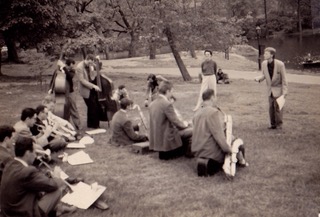It's based on the novella, "Intermission" by Owen Martell, which I read a number of years ago. It took place at his parents' house in Fla, where Evans went to recuperate from the eight months of hell he went through when he was with Miles Davis. They played for mainly Black audiences, who were intolerant of the presence of a white musician in Miles' band. According to Gene Lees, Evans was jeered at by the audiences, and he received little if any support from most of the members of the band (again, according to Gene Lees- I'm not sure which book this was from-"Cats on Any Color"( ?), so hold a seance and ask gene Lees if any of this bugs you. IOW, don't bother me.
The book mainly centered on Evans' relationship with his father, and no musicians appeared in it, so the film obviously adds a lot of material not mentioned in the book.

Rare
Rare
Rare
Rare
Rare
_forumlogo.png.a607ef20a6e0c299ab2aa6443aa1f32e.png)